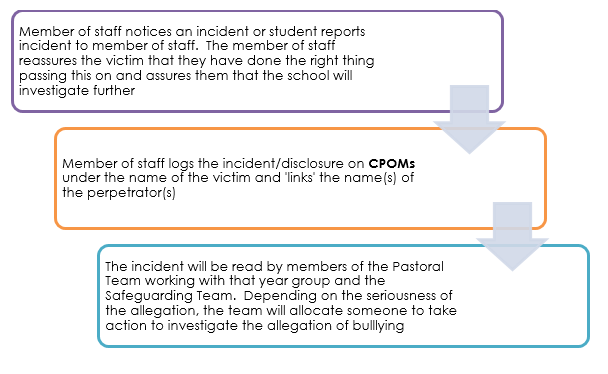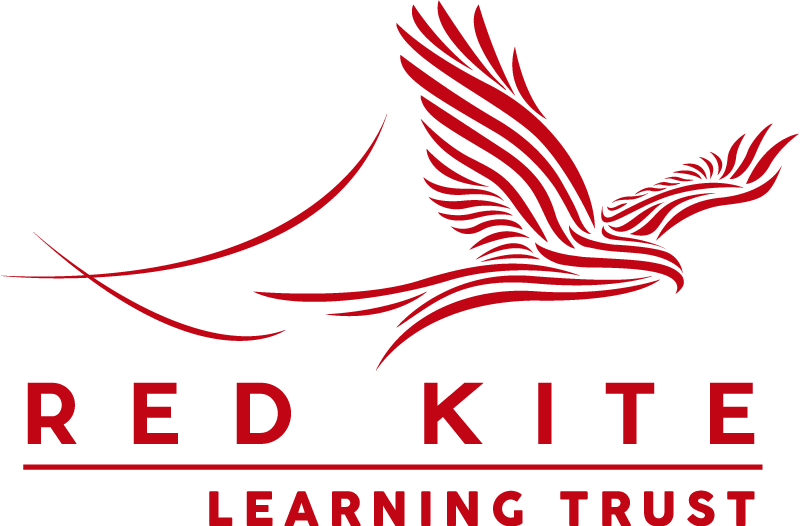Anti-Bullying
Rossett School works to promote an ethos where students are reflective, resilient and responsible. This policy will draw upon these core values to illustrate how bullying can be prevented and resolved. The School recognises that students will learn best in a safe and calm community that is free from disruption and in which education is the primary focus. Staff, students and parents have a responsibility to report bullying as soon as possible. They also have a responsibility to implement the preventative strategies outlined in the policy.
Rossett School is aware of the statutory responsibility to discipline students for poor behaviour outside the school premises. Section 89(5) of the Education and Inspections Act 2006 gives Headteachers the power to discipline students for poor behaviour when they are not on school premises. This can relate to bullying incidents occurring anywhere on or off the school premises.
This policy should be used alongside the school’s Safeguarding Children Policy as peer-on-peer abuse must be considered as a potential source of significant harm.
Aims
- To work towards the elimination of bullying at Rossett School
- To enhance the Behaviour Policy which confirms the school expectations;
- To involve all members of the school community in countering bullying;
- To enable students, staff, parents and governors to understand what constitutes bullying and their specific responsibilities;
- To ensure that there are strategies to minimise the risk of peer on peer abuse and procedures;
- To enable parents to feel confident that bullying will be firmly dealt with by the school;
- To inform all members of the school community that bullying behaviour will not be tolerated.
WHAT IS BULLYING?
‘Bullying is the wilful, conscious desire to hurt, threaten or frighten someone else’
There are different types of bullying:
- Psychological (being excluded from groups and rumours etc.)
- Cyber (abusive text messages, internet messages etc.)
- Verbal (threats, name calling, racism, homophobia etc.)
- Physical (punching, kicking, scratching, pushing, throwing objects at someone etc.)
Bullying invariably undermines self-confidence and initiative and can create a cycle of poor performance and further criticism, potentially causing depression, stress, mental or physical ill-health, with consequent absence from school or work.
Some forms of bullying may break the law and may be reported to the police by the school:
- Violence or assault;
- Theft;
- Repeated harassment or intimidation, e.g. name calling, threats and abusive phone calls, emails or text messages, sexual harassment and peer on peer abuse;
- Hate crimes – any incident which the victim, or anyone else, thinks is based on someone’s prejudice towards them because of their race, religion, sexual orientation, disability or because they are transgender.
Prevention
“A school’s response to bullying should not start at the point at which a child has been bullied. The best schools develop a more sophisticated approach in which school staff proactively gather intelligence about issues between pupils which might provoke conflict and develop strategies to prevent bullying occurring in the first place.
(Department for Education - Preventing and tackling bullying, July 2017)
Preventing bullying behaviours can be possible through a range of proactive measures. At Rossett School, we look for every opportunity to prevent bullying type behaviours from happening. Some of the actions the school takes to prevent bullying include:
- The issue of bullying is included in the curriculum and classwork e.g. Drama, English.
- Bullying is addressed through the PSHE programme and is aligned with the standards of the PSHE Association.
- The Form Time and Assembly programmes reinforce British Values and the ethos of the school.
- Anti-bullying week is dedicated to raising awareness of bullying and reminding staff and students of their responsibilities to report it.
- Students are not permitted to use their mobile phones around the school. This is partly to prevent cyber-bullying.
- Duty staff have been trained to be vigilant and to watch and listen for any bullying type behaviours, no matter how small.
- Duty points have been carefully considered to ensure there are no ‘dead spaces’ where bullying can take place undisturbed.
- Seating plans in lessons are carefully considered using any relevant information about the relationships between specific pupils.
- The School Welfare Committee regularly considers new ways to prevent bullying through their whole school projects.
- External speakers raise awareness of issues such as racism and homophobia.
- Posters around the school emphasise the importance of diversity in the school community.
- The Students’ Charter outlines the core responsibilities of students at Rossett School including the responsibility to respect others.
- Working with the wider community such as the police/children’s services where bullying is particularly serious or persistent to send a strong message that bullying is unacceptable within our school.
Rossett School recognises that specific groups of students are particularly vulnerable to bullying. These include children and young people with Special Educational Needs and Disabilities (SEND), young carers, Black and Minority Ethnic (BME), those who are, or thought to be lesbian, gay, bisexual, transgender, queer, questioning, intersexual, asexual or pansexual (LGBTQ+). As such, prevention of bullying considers the specific patterns of discrimination these groups face.
Tackling Bullying
Rossett School has clear strategies for responding to bullying incidents. These may include outcomes from the school sanction system (Choices and Consequences) as detailed within the school behaviour policy. The consequences of bullying will reflect the seriousness of the incident. All sanctions will be applied fairly, consistently and reasonably – after careful consideration of possible contributing factors such as special educational needs, disabilities or other vulnerabilities of both the victim and perpetrator.
The school will support the victim upon finding out about bullying, but will also seek to work with the perpetrator of the bullying in order prevent further incidents in the future.
Reporting Bullying
Students can report bullying of themselves or someone else in the following ways:
- Speaking to their Tutor
- Speaking to their Support Officer
- Speaking to their Director of Learning
- Year 12/13: contact the Head of Sixth Form or Sixth Form Student Support Officer
- Speaking to the Designated (or Deputy) Safeguarding Lead
- Year 7 can email their Listener
- Importantly, students are reminded that they can speak to any member of staff in school they trust
- Speaking to your parent and asking them to pass on the information to the school.
Parents/Carers can report bullying of their child or someone else’s in the following ways:
- Contacting their child’s Form Tutor by email, telephone, meeting)
- Contacting their child’s Support Officer
- Contacting the Director of Learning
- Year 12/13: contact the Head of Sixth Form or Sixth Form Student Support Officer
- Year 7 can email their Listener
- Importantly, parents/carers are reminded that they can speak to any member of staff in school regarding this. Staff will pass this on to the Pastoral Team.
Staff

Investigation
The investigation in to the bullying incident(s) will be conducted by the most appropriate member of staff, depending on the severity of the allegation. This may include the Support Officer, Director of Learning, Assistant Headteacher, Deputy Headteacher Pastoral or may include external agencies such as the Police.
Any investigation in to alleged bullying will be discreet, sensitive, timely and thorough. The exact timeline of investigations will vary depending on the scenario but will usually include:
- The victims will be talked to along with other witnesses and statements will be taken
- The accused will be talked to, to get their version of events
- Other staff, students and parents will be involved, where needed
- Parents/carers will be kept fully aware
- A record will be placed in all the involved students’ files
- All students will be made aware that such behaviour will not be tolerated
Outcomes
- The student who has been bullied will be offered support if they feel they need it. This may depend on the nature and severity of the incident and may include counselling through the Just B service or in more extreme cases, referral to external agencies such as CAMHS.
- Students who have displayed bullying behaviour will be issued sanctions in line with the school behaviour policy. These sanctions range from detentions to fixed and even permanent exclusion where it is deemed bullying has been extreme and particularly damaging.
- Parents of those bullied and bullying will be notified of the outcomes of the investigation.
- A ‘Repair and Restore’ meeting will be set up to take place as soon as possible. This is the process where both parties get an opportunity to achieve closure through mediation by trained staff and/or students.
Links
The websites listed below offer direct links to other sources of information for parents and young people.
Stonewall: www.stonewall.org.uk
Useful information and links on LGBTQ issues.
Advisory Centre for Education: www.ace-ed.org.uk
Registered charity independent of central or local government giving free advice and support to parents of children in state schools.
Anti-Bullying Network: www.antibullying.net
Established by the Scottish Executive. Useful links and reviews for teachers, parents and students on bullying and related issues.
BBC Schools: www.bbc.co.uk/schools
Includes information about bullying.
Bully OnLine: www.bullyonline.org
Information on bullying for teachers, children and schools which details the legal procedures available. This site also lists support groups for teachers.
Bullying Online: www.bullying.co.uk
Useful information and links on bullying and related issues for parents, children and teachers.
ChildLine: www.childline.org.uk
Primarily a helpline for children but has useful information and links on bullying. Chips (Childline in Partnership with Schools) encourages schools to support students in setting up anti-bullying projects.
The Children’s Society: www-the-childrens-society.org.uk
‘Bullying! Information for parents on how to help your child’ – leaflet giving information and practical guidance.
Kidscape: www.kidscape.org.uk
Advice for children, parents and teachers as well as training and sample policies.
Schools Out!: www.schools-out.org.uk
Campaigns for better support networks for gay and lesbian students and clearer guidance for teachers on issues of sexuality.
Topmarks: www.topmarks.co.uk
Aims to provide easy access to the best educational websites including information on bullying for teachers, parents and young people.
Rossett School > Students > Behaviour Policy: Anti-Bullying
Reviewed by governors: September 2021
Review: September 2022
Please click the link here for the student version of the Anti-bullying policy (can also be found in the 'Student' section of the website).
Additional links
Stonewall: Useful information and links on LGBTQ issues.
Advisory Centre for Education: Free advice and support to parents of children in state schools.
Anti-Bullying Network: Useful links and reviews on bullying and related issues.
BBC Schools: Includes information about bullying.
Bullying Online: Information and links on bullying and related issues
ChildLine: A helpline for children but has useful information and links on bullying.
The Children’s Society: Bullying! Information for parents on how to help your child
Kidscape: Advice for children, parents and teachers as well as training and sample policies.
Topmarks: Easy access to the best educational websites including information on bullying
YWCA: If looks could kill: young women and bullying’ – briefing paper




















